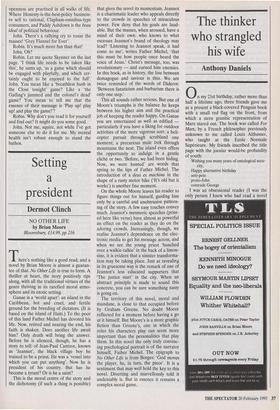Setting a president
Dermot Clinch
NO OTHER LIFE by Brian Moore Bloomsbury, f14.99, pp 216 There's nothing like a good read, and a novel by Brian Moore is almost a guaran- tee of that. No Other Life is true to form. A thriller at heart, the story positively rips along, with all the traditional virtues of the genre thriving in its rarefied moral atmo- sphere and its exotic setting.
Ganae is a 'world apart': an island in the Caribbean, hot and cruel, and fertile ground for the breeding of dictators. (It is based on the island of Haiti.) To the poor of this land Father Michel has devoted his life. Now, retired and nearing the end, his faith is shaken. Does another life await him? Only death will bring the answer. Before he is silenced, though, he has a story to tell: of Jean-Paul Cantave, known as 'Jeannot', the black village boy he trained to be a priest. He was a 'vessel into which you can put anything'. Now he is president of his country. But has he become a tyrant? Or is he a saint?
This is the moral centre of the story and the dichotomy (if such a thing is possible) that gives the novel its momentum. Jeannot is a charismatic leader who appeals directly to the crowds in speeches of miraculous power. Few deny that his goals are laud- able. But the masses, when aroused, have a mind of their own: who knows to what excesses Jeannot's brand of theology may lead? 'Listening to Jeannot speak, it had come to me', writes Father Michel, 'that this must be how people once heard the voice of Jesus.' Christ's message, too, was revolutionary — and earned him enemies. In this book, as in history, the line between demagogue and saviour is thin. We are twice reminded of the words of Diderot: `Between fanaticism and barbarism there is only one step.'
This all sounds rather serious. But one of Moore's triumphs is the balance he keeps between his higher aim and the practical job of keeping the reader happy. On Ganae you are entertained as well as edified particularly if you have a liking for outdoor activities of the more vigorous sort: a heli- copter pursuit through scrubland one moment; a precarious mule trek through mountains the next. The island even offers the opportunity to indulge in a gentle cliché or two. 'Before, we had been hiding. Now, we were hunted' are words that spring to the lips of Father Michel. The introduction of a deus ex machina in the shape of a rusty motor bike (It's old but it works') is another fine moment.
On the whole Moore leaves his reader to figure things out for himself, guiding him only by a careful and unobtrusive pattern- ing of the story. A few easy touches convey much. Jeannot's mesmeric speeches (print- ed here like verse) have almost as powerful an effect on the reader as they do on the adoring crowds. Increasingly, though, we realise Jeannot's dependence on the elec- tronic media to get his message across, and when we see the young priest 'hunched over a walkie-talkie' in the back of a limou- sine, it is evident that a sinister transforma- tion may be taking place. Just as revealing in its gruesome way is the remark of one of Jeannot's less educated supporters that `The justice start' in the city. When an abstract principle is made to sound this concrete, you can be sure something nasty is going on.
The territory of this novel, moral and mundane, is close to that occupied before by Graham Greene. No doubt Moore reflected for a moment before having a go at it himself. But Moore's is a more graphic fiction than Greene's, one in which the roles his characters play can seem more important than the personalities that play them. In this novel the only truly convinc- ing psychological portrait is of the narrator himself, Father Michel. The epigraph to No Other Life is from Borges: 'God moves the player, he, in turn, the piece'. It is a sentiment that may well hold the key to this novel. Diverting and marvellously told it undeniably is. But in essence it remains a complex moral game.


























































 Previous page
Previous page